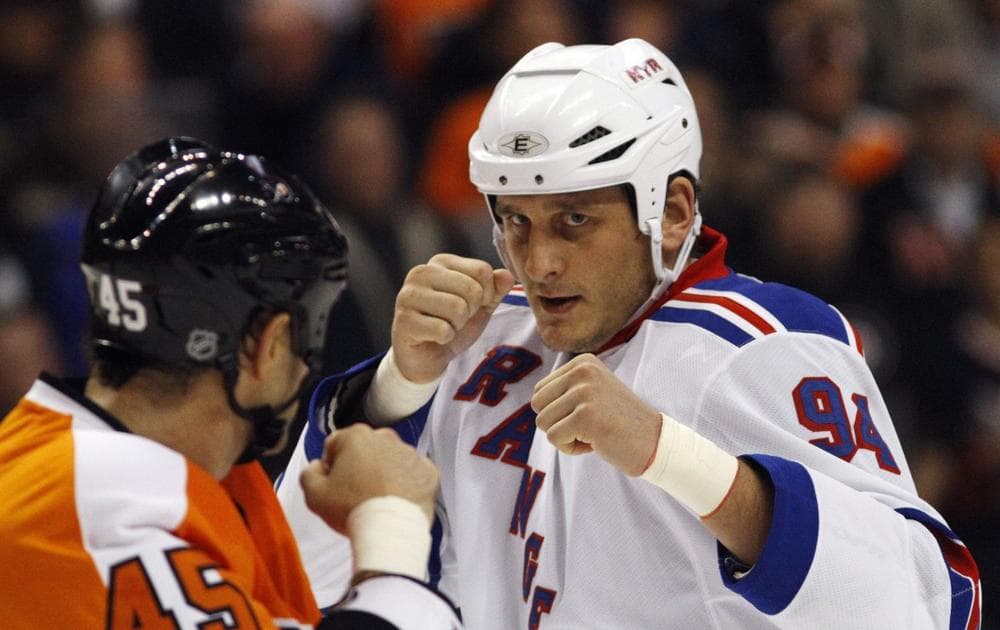Advertisement
In The News
Family Sues NHL After Hockey Player's Death
Resume
This week the family of deceased former NHL player Derek Boogaard filed a wrongful death lawsuit, accusing the league of over-medicating Boogaard and ignoring the consequences of the concussions that he had suffered. Boogaard died after an accidental prescription drug overdose in 2011. He was an enforcer who racked up career totals of 66 fights and 589 penalty minutes.
Nathan Fenno has written about the case for the Washington Times and spoke with Bill Littlefield about it.
BL: The specifics of this lawsuit charge that during the 2008-09 season, NHL doctors and staffers gave Boogaard prescriptions for 1,021 pills. Over another 16-day period, he got 150 Oxycodone pills. The motive was, what? To keep him on the ice at all costs?
NF: That seems to be what Boogaard’s attorneys claim, and it’s hard to draw another conclusion with such excessive amounts of medication.
BL: After his death, doctors found evidence in Boogaard’s brain of chronic traumatic encephalopathy. This is, of course, the same condition found in the brains of numbers of ex-NFL players. Over 4,000 former football players are currently suing the NFL. Is the Boogaard family suit likely to lead to more suits on behalf of former hockey players?
If you can draw a line between fighting and a man’s life being driven to addiction and CTE and some of these dark consequences, is that really worth it, just to be entertained or because it’s traditional?
Nathan Fenno, <em>Washington Times</em>
BL: What is the National Hockey League's defense likely to be in the Boogaard suit?
NF: From a legal perspective, the first place they’ll go to is the idea of preemption – that the collective bargaining agreement essentially preempts these claims from being made in a court setting. The NFL has tried that same tack with its concussion lawsuits, and that’s currently being adjudicated and will probably be decided this fall. The other thing they’ll try to do is remove it to federal court and argue that’s a more proper venue than the state court in which it was filed. So those will be the first two things to look for there.
BL: Do you think this case will create or, perhaps, increase the public debate about the issue of whether the NHL should continue to not only allow fights, but really assume that they’re part of the game as it’s played in the NHL?
NF: I think that’s one of the most important parts of this, and I think a public conversation is a very healthy thing about that. You know, should fighting be a part of the game, particularly when we can start to look at some of these consequences? If you can draw a line between fighting and a man’s life being driven to addiction and CTE and some of these dark consequences, is that really worth it, just to be entertained or because it’s traditional?
BL: Do you think there’s any difference among fans of the NHL and fans of the NFL in terms of how they feel about changing the game, perhaps making it less dangerous for players?
NF: I would imagine there’s a similar mentality, yeah, of not wanting to see a game watered down. At the same time, with the NFL you have these very start cases — Dave Duerson or Junior Seau or Ray Easterling – people whose lives have been torn apart after they’ve left the game. And once you start to dig into these things, it changes your perspective on the sport, or at least provides context for watching it. There haven’t been as many of those cases publicized with the NHL, and the more Boogaards are out there, or similar lawsuits that bring these tough situations to light, I think the more that could impact the way people view the game.
BL: Do you have any sense of when there will be a ruling on the Boogaard family's suit?
NF: I think this will be something that drags on for an extended period of time. The first NFL lawsuits for head injuries were filed in the summer of 2011, and they’re nowhere near close to being resolved. I think we’ll have a similar situation here.
This segment aired on May 18, 2013.